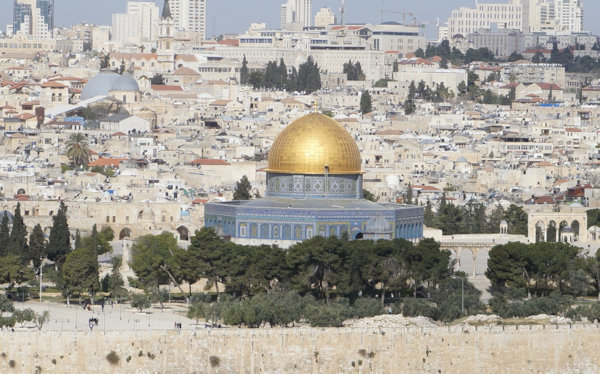Two United Methodist leaders respond to the announcement to recognize Jerusalem as Israel’s capital.
REV. SUSAN HENRY CROWE
General Board of Church and Society
THOMAS KEMPER
General Board of Global Ministries
The decision by the President of the United States to recognize Jerusalem as the capital of Israel and move the US embassy there goes against 70 years of consensus within the international community that Jerusalem should be an international city, a city of peace, open to people of all faiths. As pilgrims who have ourselves visited Jerusalem, we know first hand the deep significance it holds for people of many faiths.
The United Nation’s partition plan, adopted November 29, 1947, called for Jerusalem and Bethlehem to be a corpus separatum (a separate entity) that would be open to all. Today, not one government has its embassy in Jerusalem. Every U.S. president from Truman until now, has affirmed that any final status of Jerusalem must embrace such openness and be negotiated by Israel and the Palestinian people.
United Methodists have long supported the international consensus that the things that make for just and lasting peace in the Middle East must include a shared Jerusalem. Our General Conference declares: “Jerusalem is sacred to all children of Abraham: Jews, Muslims, and Christians. We have a vision of a shared Jerusalem, as a city of peace and reconciliation, where indigenous Palestinians and Israelis can live as neighbors and, along with visitors and tourists, have access to holy sites and exercise freedom of religious expression. The peaceful resolution of Jerusalem’s status is crucial to the success of the whole process of making a just and lasting peace between Palestinians and Israelis” (The United Methodist Book of Resolutions, 2016, #6111).
“This Advent, as Christians around the world turn our hearts toward Bethlehem to celebrate the birth of the Prince of Peace, we reject any notion that God is on one side.”
When the government of Israel annexed East Jerusalem, in violation of international law, the World Council of Churches joined the international community in protest, declaring: “This decision is contrary to all pertinent UN resolutions. It most dangerously undermines all efforts towards the just solution of the Middle East problem and thus jeopardizes regional and world peace” (WCC statement, August 1980).
The WCC statement went on to recognize that the peace of Jerusalem goes hand in hand with the peace of the entire region: “The destiny of Jerusalem should be viewed in terms of people including Christians as well as Jews and Muslims and not only in terms of shrines. Therefore, just as the future status of Jerusalem has been considered part of the destiny of the Jewish people, so it cannot be considered in isolation from the destiny of the Palestinian people, and should thus be determined within the general context of the settlement of the Middle East conflict in its totality.”
The U.S. President’s unilateral decision places another huge stumbling block in the path towards just peace for all—Israelis and Palestinians, Jews, Christians, and Muslims. It risks emboldening further Israeli settlements on Palestinian land and further displacement of Palestinians from East Jerusalem.
The World Methodist Council expressed “dismay” at the unilateral action of the US president. The Council, Global Ministries and the Methodist Church in Britain jointly sponsor the Methodist Liaison Office in Jerusalem.
In this first week of Advent, as Christians around the world turn our hearts towards Bethlehem to celebrate the birth of the Prince of Peace, we reject any notion that God is on one side. Rather we remember and celebrate the coming of Emmanuel, God with us—all of us—as we seek the things that make for just peace for all.
Last Updated on December 8, 2023

